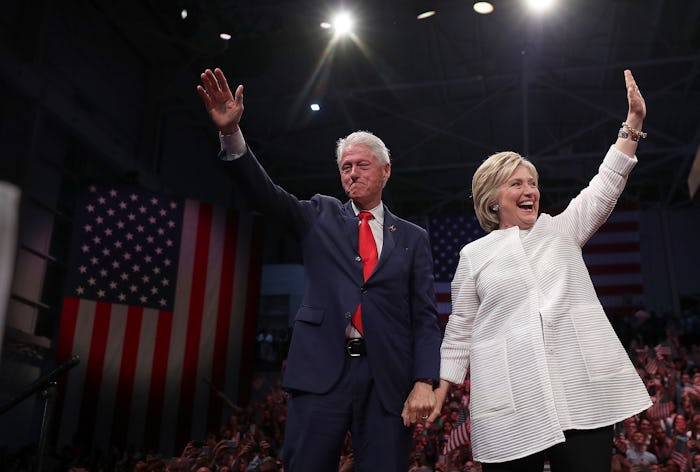News

Why Feeling Conflicted About Hillary Clinton’s Nomination Makes Total Sense
After winning the democratic primary in California Tuesday, former Secretary of State Hillary Clinton become the presumptive presidential nominee for the Democratic Party, and, unsurprisingly, her supporters were hugely excited about it. And with good reason: not only is she the presumptive nominee, she is also the first woman ever to be the presidential nominee of a major party. In other words, her win was a big deal, and an incredibly empowering message to women and girls everywhere, letting them know that if it's possible for her, it's possible for them too. But being supportive of that historic win for women's rights doesn't necessarily mean there aren't still aspects of Clinton's background and her campaign that are tough to swallow. And that's why feeling conflicted about Hillary Clinton's nomination is OK.
During the months when Clinton faced off against Vermont Sen. Bernie Sanders for the Democratic nomination, much was discussed about Sanders' inability to connect with the so-called "black vote." Polls shows that an overwhelming number of non-white Democrats supported Clinton, something that was cited as a key strength for her campaign. But what wasn't being discussed as much, according to The Nation, was that Clinton (and most significantly her husband Bill Clinton, during his presidency) contributed to a number of controversial laws and policies that had brutal implications for visible minorities, immigrants, and those living in poverty.
In her article, legal scholar and author Michelle Alexander discussed the devastating effects that many of Bill Clinton's policies had on black communities specifically, especially when it came to incarceration rates, welfare, and the "War on Drugs." Under Clinton, Alexander said, America faced "the largest increase in federal and state prison inmates" it had seen to date. And thanks to his incredibly strict "100-to-one" law differentiating crack from powder cocaine (that is, that crack, which was more often used by black people than powder cocaine), a disproportionately high number of black Americans were sent to prison for drug offenses. In fact, by the time Clinton left office in 2001, Alexander said,
in seven states, African Americans constituted 80 to 90 percent of all drug offenders sent to prison, even though they were no more likely than whites to use or sell illegal drugs.
In recent years, both Bill and Hillary Clinton have argued that the tough-on-crime laws of the Clinton era weren't designed to be so devastating to so many American families — that the staggering mass incarceration of blacks, according to author Thomas Frank's article in The Guardian, was an "unintended consequence" of something meant to protect citizens from violent crime. But Frank argued that Clinton had to be aware of the racial imbalance, because, well, plenty of people were making that fact abundantly clear. According to an article Frank cited from the Baltimore Times back in 1995,
Civil rights organizations had led a telephone campaign to pressure the president to veto the bill. At a rally last week in Chicago, the Rev Jesse L Jackson said that Mr Clinton had the chance, ‘with one stroke of your veto pen, to correct the most grievous racial injustice built into our legal system.’
The U.S. Sentencing Commission also argued against Clinton's laws, according to Frank, noting explicitly that,
The 100-to-1 crack cocaine to powder cocaine quantity ratio is a primary cause of the growing disparity between sentences for black and white federal defendants.
Despite the criticism, Bill Clinton still signed the bill.
But the Clintons' stance on incarceration wasn't the only thing that left many Americans worse off. Even though Bill Clinton is often hailed as having done wonderful things for the economy during his presidency, Alexander argued that the reality isn't quite as encouraging as many people think:
As unemployment rates sank to historically low levels for white Americans in the 1990s, the jobless rate among black men in their 20s who didn’t have a college degree rose to its highest level ever.
The reason? According to Alexander, the booming incarceration rate of those young, black men — men who weren't being taken into consideration in government statistics.
This reality is troubling for many Americans, especially now that Hillary Clinton all but has her name officially on the ticket, even for those who are hailing her win as a step forward for feminism. But, at the same time, it appears as though many are hoping that, during the possible second Clinton era, things under Hillary will be very different (and based on her campaign, she's promising they will be). When questioned directly earlier in her campaign about a very troublesome 1996 quote about violent youth she called "superpredators" who need to be "[brought] to heel," Clinton expressed regret over her words, according to NPR, and said, "looking back, I shouldn't have used those words, and I wouldn't use them today."
Unlike her husband, Clinton is vocal about strengthening social security, according to NPR, as well as working to repair some of the damage done by her husband in the '90s. But another thing working in Clinton's favor? According to Politico, a lot of non-white voters just really don't like Bernie Sanders (and they like Obama, who is decidedly pro-Hillary). What's more, however, is that now, Clinton will be going head-to-head with the incredibly polarizing Donald Trump, which means that, despite some voters ongoing concerns about the Clinton legacy, she still could be the best candidate in many voters' eyes.
In any case, there is no doubt that these issues should not be ignored — perhaps especially by Democrats, and Clinton supporters, who can expect their candidate to uphold the expectations of all of the voters, regardless of race or ethnicity, preparing to cast a ballot in her favor this November.